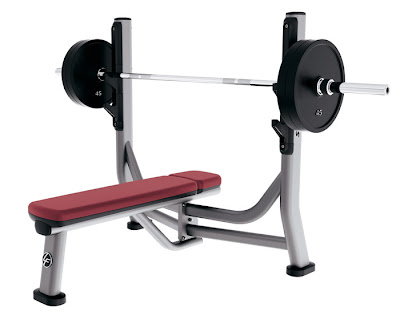Personally, I think the whole obsession over this amazingly overrated feat, is just that - an obsession.
The Bench Press is a lift that mainly works the pectorals, deltoids, and triceps. All bodies are shaped & sized differently, and the success of achieving a higher max lift depends on many factors. For one, you cannot say that a person who benches 400 lbs. is stronger than someone who bench presses 300 lbs., for example. Many times, the short-armed, broad chested individual has the advantage over the long-armed, narrow chested person, without sheer strength even being a factor. You throw in some good form along with the shortened extensions of exertions and a perfected technique, and presto, you have a max lift that is way higher than a person who is way stronger, but has the disadvantage under the bench, and so on.
Anyway, I'm not writing this post to analyze the "bench press" in all the facets found within the motion itself, but I'm simply going to provide a formula that will give you a semi-accurate measure and/or an estimate of what your maximum, one rep (max out) bench press lift is, without having to worry about a spotter or the weights falling on your chest, head, or whatever else!
The Formula:
Take the "weight lifted" while performing the bench press and divide it by the whole figure found by taking the numeric value of 1.0278 minus 0.0278 times the number of reps involved.
It would look like this in math: [weight lifted / 1.0278 - (0.0278 x # of reps)]
By using that formula, for example, if you lifted 225 lbs. 6 times, your estimated max lift for the bench press would be nearly 262lbs.
Another example, using this form of calculation would be, if you can bench press 215lbs. for 5 reps in a row, your maximum lift would be estimated at 242 lbs.
I've tested this formula years ago, and it is reasonably accurate. It is, of course, not 100% precise down to the pound - due to many variables that may vary from day to day within the human body itself, but it makes for an excellent estimate when you have no spotters around for safety, while testing your maximum bench pressing abilities.
Side Note: This formula will definitely be more accurate when testing in the lower rep ranges. Since there are fast-twitch and slow-twitch muscle fibers involved, to get an estimate closer to your 1 rep max bench press you shouldn't calculate performing a lift you'd use for endurance training and/or slow-twitch muscle fibers. This "How To" calculation is not intended to be applied to repetitions in the 15, 20 or 30 range, for example. I would say no more than 10 reps while using this formula for a better estimation of your "max out" weight.
Well, I thought I would share that with ya. Happy lifting and good luck with your gains...

---End of Post "How to Estimate your Max Bench Press Lift"
Related Post: Bench Shirts & Excessive Gear
Well, I thought I would share that with ya. Happy lifting and good luck with your gains...

---End of Post "How to Estimate your Max Bench Press Lift"
Related Post: Bench Shirts & Excessive Gear
No comments:
Post a Comment